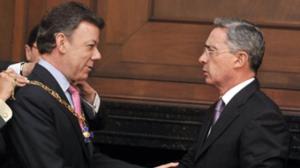Uribe Brought Up Reelection. Santos Puts it Back Down.
Colombian president Juan Manuel Santos’ administration platform has focused on bringing about institutional reform. He led an effort for government to formally acknowledge the victims of Colombia’s internal conflict, and two years ago he started peace negotiations with FARC, Colombia’s infamous guerilla movement, in Havana, Cuba. These past weeks, Santos has concentrated on reforming reelection law in an effort to revoke changes in legislation performed by his predecessor, once closest ally, and now greatest critic, Álvaro Uribe.

Uribe made a large impact in Colombian politics when he passed a law that allowed him to present himself for re-election, a measure previously prohibited by the Colombian Constitution. Although he was expected to encounter some resistance, Uribe was able to pass the law because of his public personality, thanks to increased measures against FARC and an economic boom. Uribe even tried to present himself for a third term in 2010, but the legal reform required for yet another reelection was deemed unconstitutional and was therefore rejected. As such, the Uribe era of Colombia lasted from 2002 to 2010.
Uribe’s successor, Juan Manuel Santos, originally enjoyed warm relations with the previous president, having appointed him as Minister of Defense and backing his election campaign in 2010. However, tensions between the two political heads rose shortly after Santos’ election in 2010, and by 2012 the two had a public fallout. This was the result of Santos taking measures that Uribe did not agree upon, such as discussing offering judicial leniency to FARC in exchange for their disarmament, or warming up relations with Venezuela’s then president Hugo Chavez. In the years that followed, Uribe started spiritedly criticizing his successor.
Santos was once again elected president in June of this year, beating Uribe’s choice candidate, Oscar Ivan Zuluaga. Santos proved on September that he is intent in separating himself from Uribe when he presented a bill that would eliminate the possibility of re-elections. During this year’s campaign, Santos suggested that he would extend the length of public office to five or six years, however he has since backed off from the idea. The bill also proposes changes to government oversight mechanisms and provincial representation in congress. The bill was to be debated in eight sessions in Congress, between Santos and Uribe’s respective parties, as well as with the leftist party Polo Democratico.
After just two of the eight planned sessions, Senate approved of the bill’s article that eliminates the possibility of re-election. Despite Uribe’s participation and influence in senate, the bill has been processed smoothly and has received little opposition. Congress also closed the door to the possibility of calling for re-elections, making it only possible through a referendum or through Constituent Assembly. The bill’s remaining points on government oversight and provincial representation will still be debated in Congress for six more sessions.
Re-elections are currently a hot topic all over Latin America. Recently, Bolivia’s Evo Morales was re-elected president for the third time. Similarly to Santos, Morales changed the country’s constitution to achieve realection. However, unlike Santos, Morales was successful in remaining in power, his logic being that since he changed the country’s constitution during his first term, the next elections would fall under the new constitution, which allows for two consecutive presidencies. Cristina Fernández de Kirchner from Argentina also attempted to change the country’s constitution to allow for her re-election, however her party’s diminished presence in Congress made such change a dream, which means that Mrs. Kirchner will have to look for a successor of her policies. Finally, Brazil’s Dilma Rousseff is having trouble being re-elected.
Santos’ latest move will have a great impact in Colombian politics. Santos’ successor will have less time to create lasting policies, if they even desire to do so. It can be expected that there will be a greater clash between the ruling party trying to keep their policies and opposing parties trying to change it. Whether this will have an impact on the Colombian economy is unclear, however it is doubtful that anyone would try to fix what is not broken. Regardless, Santos has proven that he has completely separated himself from Uribe, and retains his dominant role in Colombian politics.
